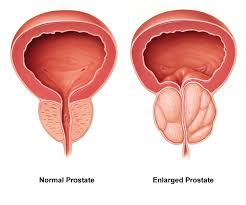At Arkansas Urology, we know that men’s health concerns can feel confusing when symptoms overlap. One common source of uncertainty is distinguishing an enlarged prostate also called benign prostatic hyperplasia (BPH) from prostate cancer. Keep reading to learn more about enlarged prostate BPH vs prostate cancer, why BPH and prostate cancer can produce similar urinary changes, and what to expect from evaluation and treatment so you can protect your prostate health.
Understanding the Prostate Gland
The prostate gland is part of the male reproductive system. About the size of a walnut, the prostate surrounds the urethra, the tube that carries urine from the bladder out of the body. The prostate makes fluid for semen. When the prostate grows with age or develops abnormal cell growth, urination can change. Understanding prostate changes helps men recognize urinary symptoms early and get care.
BPH vs. Prostate Cancer: Key Differences
Benign prostatic hyperplasia (BPH) is a noncancerous enlargement of prostate tissue. Extra growth creates enlarged prostate tissue that narrows the urethra and slows urine flow. By contrast, prostate cancer occurs when cancerous cells form within the gland and may spread beyond it. In the early stages, there may be no symptoms. Because these conditions share similar symptoms, only clinical diagnostic tests can differentiate prostate cancer from BPH.
To make the distinction clearer, it helps to think about the underlying process. With BPH, the prostate’s normal cells keep multiplying and create bulk that squeezes the urethra. With prostate cancer, abnormal prostate cells divide uncontrollably, leading to a tumor that can break through surrounding prostate tissue and spread to lymph nodes or bone. Both conditions can cause changes in urination, but the stakes are very different.
Men with BPH often live many years with manageable urinary changes, while men with untreated cancer face the risk of disease progression. That is why doctors use tools like the digital rectal exam, prostate specific antigen blood test, and sometimes a prostate biopsy to determine whether changes are due to an enlarged prostate or a malignancy.
The main difference is that BPH is a noncancerous enlargement while prostate cancer involves abnormal cell growth that can invade other tissues. However, both conditions affect the same organ and often appear at the same stage of life, which can make them difficult to tell apart without a professional evaluation.
What are the Symptoms of BPH?
Many men ask about the symptoms of BPH. In daily life, men may notice problems such as:
- Trouble starting urination
- A weaker stream or dribbling
- Waking frequently at night to urinate
- Urgency to urinate
- Feeling the bladder does not empty fully
Untreated BPH can also lead to complications like bladder stones, infections including bacterial infection, or even kidney damage. If BPH symptoms keep returning or worsen over time, it’s important to be evaluated by a urologist so the obstruction can be treated safely. These changes develop gradually as the prostate enlarges and are often prostate gland caused by obstruction of the urethra.
Prostate Cancer: What is it?
Prostate cancer develops when prostate cells undergo mutations and form cancerous cells. Unlike BPH, the concern is that the disease may progress beyond the gland. Prostate cancer symptoms can be subtle at first. Some men may notice blood in urine or semen, pelvic or back pain, unexplained weight loss, or bone pain in advanced cases. Others remain without symptoms until advanced stages. Talking to a provider about developing prostate cancer risk and your family history helps determine whether you should have testing.
Symptoms of Prostate Cancer
Men should be alert to potential warning signs. Common symptoms of prostate cancer may include difficulty urinating, weak urine flow, pain during urination or ejaculation, blood in urine or semen, or discomfort in the pelvic area. In advanced disease, fatigue, weight loss, or bone pain may appear. Because these issues overlap with BPH symptoms, diagnostic testing is essential.
Prostate Cancer Risk Factors
Key prostate cancer risk factors include older age, family history, African American ethnicity, and lifestyle factors such as obesity, diet, and smoking. These and other risk factors can contribute to an increased risk of cancer. While BPH itself does not raise the risk of prostate cancer, the two can occur together. Understanding your risk of developing cancer ensures the right monitoring plan.
How Doctors Detect Prostate Cancer and Diagnose BPH
Your evaluation starts with a thorough medical history and physical examination. To detect prostate cancer or confirm BPH, your provider may recommend:
- Digital rectal exam to feel the gland
- Blood test with prostate specific antigen (PSA testing). An elevated PSA can lead to further imaging
- Imaging such as ultrasound or MRI to assess prostate changes
- Prostate biopsy if cancer is suspected
These diagnostic tests distinguish between prostate enlargement due to BPH and early stage prostate cancer. Identifying the cause early allows for better treatment planning.
Treatment Options for BPH
Treatment for BPH is personalized. For mild cases, lifestyle adjustments and monitoring—sometimes called watchful waiting—may be all that is needed. For more noticeable patient’s symptoms, options include medications such as alpha blockers to relax the muscles of the prostate and bladder neck to improve urine flow or drugs that shrink the prostate and ease urinary symptoms. In some cases, minimally invasive procedures using heat, steam, or implants relieve pressure on the urethra, and surgical procedures such as transurethral resection of the prostate (TURP) are considered effective.
Prostate Cancer Treatment Options
Care for prostate cancer depends on the stage of the disease. Options may include active surveillance or watchful waiting for slow-growing tumors, radiation therapy or hormone therapy to manage growth, or surgery for localized disease. Advanced cancers may call for chemotherapy and targeted agents, or participation in clinical trials. Your provider will explain each option, review side effects, and help decide the best path.
Why the Differences Matter
Because both BPH and prostate cancer can cause similar symptoms, men may delay care thinking changes are a normal part of aging. Yet only diagnostic evaluation can confirm the difference. Recognizing the signs and seeking timely care helps prevent complications, such as kidney problems from BPH or progression of early stage prostate cancer to advanced disease. Early diagnosis can mean simpler treatments, better results, and peace of mind.
Why Choose Arkansas Urology
Choosing Arkansas Urology means you’re cared for by a team that manages both BPH and prostate cancer every day and understands how often the two can look alike. We start by listening—your goals, your history, and your questions—then match what you’re feeling with targeted diagnostic tests. That includes careful medical history review, physical examination, PSA testing, and when needed, image‑guided prostate biopsy to accurately differentiate prostate cancer from an enlarged prostate.
For BPH, we tailor care to your life. Many men do well with medicines like alpha blockers or with minimally invasive procedures that relieve pressure and improve urine flow without a long recovery. When surgery is the better choice, our surgeons perform proven surgical procedures such as transurethral resection to reduce obstruction and protect bladder function.
For prostate cancer, we offer a full spectrum of prostate cancer treatment options—from active surveillance for low‑risk disease to radiation therapy, hormone therapy, or surgery when treatment is needed. Your plan is built around your stage, your overall health, and your preferences. Throughout care, our team explains results clearly, tracks progress, and adjusts treatment so you’re never left guessing.
Above all, you get a partner. Our specialists coordinate every step, from ruling out malignancy to choosing the right treatment, so you can move forward with confidence.
Take Charge of Your Prostate Health
If you notice urinary changes, schedule an appointment with Arkansas Urology. Our team will carefully determine whether your symptoms are related to BPH or prostate cancer, confirm the cause with precise testing, and design a personalized plan that supports your health and long‑term peace of mind.




